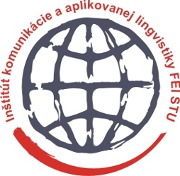Faculty of Electrical Engineering and Information Technology
Slovak University of Technology
Ilkovičova 3
812 19 Bratislava

| Institute of Communication and
Applied Linguistics
Faculty of Electrical Engineering and Information Technology Slovak University of Technology Ilkovičova 3 812 19 Bratislava |
 |
|
Language teaching at the Slovak University of Technology (then Slovak Technical University) commenced in 1951 when the Department of Languages was established. The Department provided language education for the whole university. Later it was split in three departments. But the Faculties of Electrical and Mechanical Engineering continued to have a mutual department. In 1981 an all-university Department of Languages was established with four sections serving the Faculties of Electrical Engineering, Chemical Engineering, Mechanical Engineering and Civil Engineering respectively. Due to many problems linked with the lack of contact between the department and the faculties, it was necessary to make a change. A decision was made to establish departments of languages at individual faculties for the sake of language education more closely linked with faculties' specific needs. On 1 April 1990 a department of languages was founded at each faculty. On 1 December 2012 the Department was renamed to the Institute of Communication and Applied Linguistics. The Institute has specified the aims of foreign language teaching on the basis of extensive needs analysis carried out amongst Faculty graduates. No professional can make a successful career without having mastered at least one foreign language. Its knowledge is now considered a matter-of-course in most industrial and commercial companies. Due to regional and economic specifics of Slovakia, specialists must be able to communicate in a foreign language. Their professional life requires oral as well as written communication for general and specific purposes. It does not suffice to know only the grammar and vocabulary of the given language, but it is also necessary to understand the meaning of lingual and extralingual means of other cultures and subcultures. For this reason, it is important (in accordance with EU policy) to improve the education of students also in the area of intercultural communication.
Institute teachers have long experience in different areas of education:
The aims of foreign language teaching provided by the Institute include:
|